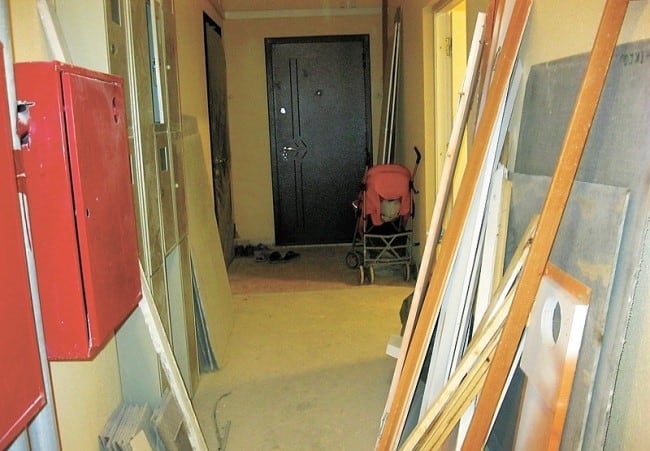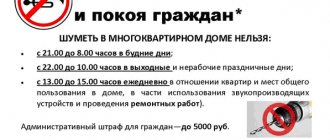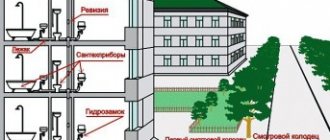Reasons for disagreement
Some of the neighbors may place too many bulky objects in the space of the common corridor, as a result of which passage to other apartments becomes difficult and it becomes impossible to fully open the entrance doors.
This not only causes serious inconvenience in everyday life and spoils the appearance, but also violates fire safety rules. According to them, nothing should prevent the evacuation of residents in the event of an emergency.
Objects piled up, moreover, can contribute to the appearance of rats, cockroaches and other parasites in the living space, which can then be very difficult to remove. And if neighbors do not want to remove their things from the common corridor, then some measures will have to be taken to avoid negative consequences.
There are several ways to solve the problem, which differ significantly from each other. For some, just a simple verbal remark is enough, but for others you will have to deal with completely different methods.
So where should you turn if your neighbors have littered the entire common corridor with their things?
- To the neighbors themselves, with a collective or individual request.
- To the Management Company.
- To the Fire Inspectorate.
- To Rospotrebnadzor.
- To the court (with a corresponding statement of claim).
Construction waste on the landing
Repair work in apartment buildings is common. However, for some neighbors, cleaning up construction waste is an overwhelming task, and they place it on the landing where it can be stored indefinitely. Such trash is not only an obstacle to passage and opening doors in emergency situations, but also poses a fire hazard. This category of things may include: wallpaper, furniture that has dried out, frames from old windows, doors, etc. If such a mountain of garbage has formed for just a couple of days, then you can easily forgive your neighbor for this, but if a fire hazardous landfill has been located for a long time on the site, then the issue requires a quick solution. At the same time, it is not at all necessary to clean up the trash after violators of cleanliness with your own hands. To ensure that neighbors quickly remove their trash and no longer litter the corridor and stairwell, the complaint is sent to the fire inspection authorities.
The Housing Code of the Russian Federation obliges residents of an apartment building to comply with fire safety rules. When neighboring people clutter the common area with garbage, they are violating these rules.
When a complaint is made to the fire safety authorities against neighbors, it is better to support it with evidence of violation of the rules by providing photographs of the corridor or staircase. Typically, inspection staff quickly respond to such statements and go to the site to conduct an inspection. A sample of such an application can be downloaded from the official website of the fire safety authorities and filled out at home. After which the complaint can be submitted electronically, or you can go to the inspection department and hand it over in person.
Another authority where a complaint can be filed against a neighbor who pollutes the common home area is Rospotrebnadzor. This organization is responsible for the proper maintenance of apartment buildings and regulates compliance by its residents with sanitary and hygienic standards, which are the same and mandatory for all living citizens.
If a dump occurs in the corridor due to the fault of a neighbor, then after some time this is fraught with the breeding of rats, mice, cockroaches and other harmful organisms. According to the “Sanitary Rules and Standards”, it is strictly forbidden to litter corridors, stairwells, inter-apartment passages and vestibules. If you make a written complaint against your neighbors, the Rospotrebnadzor authorities will conduct an inspection into the violation of standards, and violators will receive a fine and an obligation to clear the premises of garbage.
The fine from Rospotrebnadzor varies from 500 to 100 rubles.
In addition to this organization, the fire inspectorate can also impose a fine on residents who do not comply with sanitary standards and fire safety rules. If the fact of violation is recorded and confirmed, then the neighbors will have to pay an amount of 30 thousand rubles. If the violators do not understand the first time, then you can call the fire department as many times as you like; accordingly, the size of the fines will quickly increase, and this can be an excellent motivation for restoring order.
For particularly stubborn neighboring “dirties”, you can organize an attack from several sides at once, filing a statement about violation of norms to several organizations at once. Then you will have to pay fines from both Rospotrebnadzor and the fire inspectorate. And these are already impressive amounts.
Diplomatic method of struggle

Like any other conflict, it is better to try to resolve this issue through peaceful negotiations with residents. You can contact them yourself and ask them to remove all trash from the common area.
Perhaps such a remark will have an effect, and they will move their things to another place. You can also gather all the homeowners whose apartments are located in this corridor and approach the unscrupulous neighbors all together.
If people understand that this is not just someone’s whim, but that their trash actually interferes with the passage and turns the corridor into a dump, then most likely they will think about removing it.
It is best to approach this calmly, without aggravating the situation. Advise on how to rearrange things so that they take up less space: hang bicycles on the wall, fold the stroller, and put small items in piles or use a separate box for them.
With this approach, there is a much greater chance of reaching an agreement with people, avoiding unnecessary conflicts and writing numerous complaints.
other methods
If no one wants to be contacted personally, there is an option to write a group letter and place it in the mailbox or directly under the door.
The main thing is to correctly formulate the reasons for your dissatisfaction and the request not to litter the common corridor with your things.
The more people sign such a note, the higher the likelihood of a positive solution to the problem. It is best to keep copies of this paper, as they can serve as evidence that the neighbors did not respond to numerous requests and complaints.
Especially if it comes to filing a claim in court.
You can approach this issue creatively - compose and print an advertisement that describes the risk associated with littering the corridor and the possible consequences for those who ignore fire safety rules. There is a chance that careless neighbors will think twice, because no one wants to be punished for their actions.
Some residents act in a not the most ethical, but quite effective way: they regularly drag rubbish under the door of its owners. If a person is forced to clear away rubble every day in order to get into his own apartment, then sooner or later he will get tired of it and will simply put his things in another place.
There are several legal ways to deal with negligent neighbors:
- contacting the management company;
- complaint to the fire inspectorate;
- application to Rospotrebnadzor;
- trial.
COMPLAINT TO THE MANAGEMENT COMPANY ABOUT CLUTTERING OF THE CORRIDOR BY NEIGHBORS
The next step in solving this problem may be to contact your management company (hereinafter referred to as the Management Company). A written statement should be sent there indicating the problem. It is advisable to refer to the rules for the use of common property and fire safety standards. Having received the application, the management company must send its employee to the site for inspection and drawing up a report. After this, the management company may require the neighbor to remove all trash from the landing, warning about the possible consequences. Employees of the management company do not have the right to touch or remove other people’s things on their own. But they must react, otherwise they themselves may be held responsible later. If neighbors do not respond to the demands of the Criminal Code, more stringent measures should be taken.
Option 2:
Management Company

What to do if neighbors do not respond to requests and ignore comments, announcements and collective letters? In this case, you can contact the chairman of the house council or directly the management company.
The chairman, in fact, can only hold a conversation, explain why the premises should not be littered, and threaten to appeal to other authorities.
The common corridor, as well as the staircases, entrance, attics and basements, is part of the common property and, therefore, is in the shared ownership of all residents. Therefore, its maintenance and upkeep in proper order is the responsibility of the management company.
Homeowners can file a complaint about litter in the common corridor and request that the situation be corrected. It is advisable to attach photographs to the written application that show the condition of the premises.
The management company, in turn, must organize an official inspection, and, if the fact of littering is confirmed, take appropriate measures. An act is drawn up, on the basis of which the Criminal Code obliges residents whose belongings interfere with the passage and violate fire safety rules to remove them from the common area.
If this instruction is ignored, then this serves as a reason for resolving the issue in court.
Where to go if the management company refuses to do anything? The answer is very simple: you need to file a complaint with the housing inspectorate. Refusal to maintain common property in proper order, which is expressed in a lack of response to residents’ complaints, is a failure to fulfill duties, and this is a rather serious violation. A fine in the amount of 40 to 50 thousand rubles may be imposed on the management company or homeowners association.
What if neighbors litter common areas?
If neighbors have crowded the landings with their belongings, making it difficult to pass, you should not ignore this. After all, clutter not only spoils the appearance of the site and interferes with passage, but also creates a fire safety hazard.
There are several ways to solve this problem:
- conversation with neighbors;
- contacting management companies;
- complaint to the housing inspection
- contacting the Ministry of Emergency Situations, the fire inspectorate;
- application to the court.
Conversation with neighbors
How to negotiate with neighbors? Photo No. 2
It is better to start resolving the issue with peaceful negotiations with neighbors. You can try to ask them in a friendly manner to remove the things that are bothering you. In addition, it is worth recalling the rules for the use of joint property and current fire safety standards.
You can communicate with neighbors yourself or involve other residents of the house in this process. Or even bring this issue up for consideration at a general meeting of all residents. The main thing is to act diplomatically and ask to remove things, referring to the norms established by law. But, unfortunately, not all neighbors respond to simple requests.
In this case, some advise using a little trick and posting notices around the house with links to laws about the need to remove all things from common areas. And describe the negative consequences of failure to comply with this instruction. But, if your neighbors turn out to be a “tough nut to crack” and such methods do not work on him, then you will have to resort to the help of official authorities.
This is interesting: How to write an application for a part-time job?
Contacting management companies
The next step in solving this problem may be to contact your management company (hereinafter referred to as the Management Company). A written statement should be sent there indicating the problem. It is advisable to refer to the rules for the use of common property and fire safety standards. Having received the application, the management company must send its employee to the site for inspection and drawing up a report.
After this, the management company may require the neighbor to remove all trash from the landing, warning about the possible consequences. Employees of the management company do not have the right to touch or remove other people’s things on their own. But they must react, otherwise they themselves may be held responsible later. If neighbors do not respond to the demands of the Criminal Code, more stringent measures should be taken.
Complaint to the Housing Inspectorate
Where can I complain if I can’t reach an agreement with my neighbors? Photo No. 3
Housing inspection bodies have been established in each city. They are called upon to monitor compliance with housing legislation. Within the framework of their powers, they can conduct inspections, issue orders and issue fines to violators. It is better to contact the Housing Inspectorate with a written application, or even a collective one.
After receiving the application, the inspection staff will notify the applicant of the time and date of their visit. Based on the results of the inspection, they will draw up a report on the violation. A person who allows littering of common areas in a house may be held administratively liable.
Contacting the Ministry of Emergency Situations, the fire inspectorate
A complaint about violation of fire safety standards can also be submitted to the Ministry of Emergency Situations and fire services. Consideration of such applications falls directly within their competence. After receiving a complaint about clutter in a stairwell, they must send an inspector to the site to inspect it. Based on its results, he can draw up a violation report and impose a fine on the negligent neighbor.
If after the first time the neighbors did not react, then you can call the firefighters again. Eventually, neighbors should get tired of paying fines. In this case, the management organization may also be held liable. Therefore, it is also in her interests to keep the resolution of this issue under control.
Application to court
Another way to influence untidy neighbors is to go to court. Of course, this measure should be considered as a last resort if others have not brought the desired result. After all, the court will need to file a claim, pay a state fee, and defend your position during the review process. Not many apartment building residents want to waste their time on litigation.
However, sending a claim to a neighbor with a request to eliminate the violation or a copy of the claim itself before filing it in court may have the desired effect on him.
This is interesting: How to open an advertising business from scratch
Where to go for other violations?
What should you do if your neighbors litter their apartment and it bothers those around them? Photo No. 4
Littering of stairwells is not the only problem with neighbors in apartment buildings; residents of such houses very often have to deal with screams and scandals behind the walls, noise at night, repairs late at night or early in the morning, dirt and garbage in common areas.
In such cases, you can also complain to management organizations, sanitary and fire inspection authorities, housing inspectors, and the court. The district police officer can also help calm down the screaming neighbors.
Fire inspection

Many of the things that residents put on the landing or in a common corridor not only interfere with passage, make it difficult to open doors and block escape routes in the event of an emergency, but are themselves a fire hazard.
Such items include old dry furniture, rolls of wallpaper, window frames, doors and much more. Most often, such construction waste appears when neighbors begin to make repairs and cannot find a better place to put everything unnecessary.
Sometimes, such a dump is formed for just a couple of days, and residents quickly take all the trash to garbage containers. But quite often, the temporary home of used items turns into a permanent one.
You shouldn’t take responsibility and throw rubbish in the trash. Otherwise, it will turn into a system. If such a situation arises, it is necessary to force the violators to vacate the common corridor on their own. Contacting the local fire inspection authorities will help with this.
In accordance with the provisions of the current Housing Code, residents of any apartment building are required to comply with fire safety rules. Storing unnecessary items and construction waste in a common area is a direct violation of them.
If peaceful negotiations have led nowhere, and the management company’s instructions are ignored, then filing a complaint against negligent neighbors can help. It is also advisable to attach a detailed photo report on the condition of the common corridor to the written appeal and indicate the period during which the neighbors are in no hurry to throw away construction waste.
Inspection staff must promptly respond to the complaint and come to the site with the appropriate inspection. Based on its results, residents who violate fire safety rules may be subject to a fine of 3,000 to 4,000 rubles. This often serves as an excellent motivation for cleaning the common corridor and taking the trash to the landfill.
If the neighbors do not react at all, the fire department can be called again. Repeatedly holding negligent homeowners accountable can have an impact.
What rules govern the procedure?

In addition to the fact that littering at the entrance is an unpleasant phenomenon, it is also prohibited by a number of rules.
First of all, this concerns fire safety.
According to the relevant regulations, it is prohibited:
- equip storage rooms and utility rooms on staircase landings, place large items, furniture, flammable materials and combustible substances for storage;
- block escape routes and fire exits, which include stairs, balcony and interbalcony doors, exits to fire escapes, and passages on loggias, with foreign objects or equipment.
Quite often, during renovation work, apartment residents place old furniture, window frames, doors, boards, rolls of wallpaper, and various construction waste on the staircases.
All of these items are fire hazards and should not be stored in public areas. Unnecessary waste must be disposed of immediately in a landfill. Often, you can also see flammable substances that neighbors do not risk keeping at home and leave in the entrance.
However, it is unrealistic to look after them around the clock, and they can ignite due to someone's hooligan behavior, which will lead to very serious losses.
According to Federal Law, any residential premises must comply with established sanitary standards and rules. In accordance with them, the entrance must be kept clean, and dumping waste in the common area is not allowed. Failure to comply with these requirements will inevitably lead to the spread of diseases, the appearance of rats, cockroaches and other pests.
There are also standards for the maintenance of residential buildings and litter in the entrance, in accordance with them, is also a violation for which certain liability is imposed.
Rospotrebnadzor

This is another body that monitors the proper maintenance of apartment buildings and where you can turn to combat litter in the common corridor. It regulates compliance with sanitary and hygienic requirements, which all residents without exception are required to comply with.
When a dump is formed in the corridor, there is a significant risk of rats, mice, cockroaches and other parasites for which a variety of rubbish is an excellent habitat.
As described in the “Sanitary Rules and Standards”, littering stairwells, cages, inter-apartment passages and vestibules is strictly prohibited.
If you make a written complaint in the proper manner, an inspection will also be carried out to determine whether the premises do not comply with sanitary and hygienic standards. If a violation is confirmed, a fine will also be imposed on the neighbors.
Its amount is not so large, from 500 to 1000 rubles. However, if you simultaneously file a complaint with both Rospotrebnadzor and the local fire inspection authorities, the amount of the fine will be much more significant. In addition, an inspection from two authorities at once may turn out to be twice as effective, and residents will decide that it is better to remove the garbage than to regularly pay for its storage.
Legislation on the use of common premises
In relation to premises in common use by residents of apartment buildings, the following rules apply:
Table 1. Laws on the procedure for using common areas of apartment buildings
| Rules for the maintenance of common property, approved by Government Decree No. 491 of August 13, 2006 | They regulate the composition of common property in multi-apartment buildings, the purpose of individual premises, requirements and control over the maintenance of territories |
| Article 36 of the Housing Code of the Russian Federation | The procedure for the use and adoption of decisions by the general meeting of owners of apartment buildings on the use of common areas in the premises has been established |
| Article 110 of the Housing Code of the Russian Federation | Status of housing and housing construction cooperatives, responsible persons for the maintenance and management of the house, including common areas |
| Federal Law No. 214 of December 30, 2014 “On participation in shared construction” | Determines the right of joint ownership of apartment owners to common areas, distribution of shares of ownership of premises in common use, procedure for use |
Source: regulatory framework Consultant

Rice. 1. Cluttering the corridor, what to do and where to go
Appeal to the district police officer
This measure can be used if neighbors not only refuse to clean up, but also masterfully avoid meeting both with employees of the management company and with representatives of the fire inspectorate and Rospotrebnadzor.
After all, if they do not receive an appropriate order to put the common area in order, then subsequently a fine cannot be imposed on them for failure to comply.
By contacting your local police department with a statement, you can solve this problem.
We are trying to come to an agreement with the neighbors
We begin to resolve any controversial situations through conversations. Without aggression, peacefully and calmly. Please note to those who live nearby that a bicycle, closet, boxes or leftover building materials are obstructing the passage or even blocking the door.
This can be done with the help of an announcement, where you describe the possible risks if you leave things on a common area untouched. Some residents will begin to move after such information. There was no reaction, move on to talking.
You say that there shouldn’t be trash on the site all the time. You can’t turn the situation into a situation where I’m moving in the closet now, and in a couple of weeks I’m taking out the chest and dressing table.
Ignore the arguments about a small apartment, where there is absolutely no way to store these especially important boxes. And about the huge number of stomping children, they can barely get into the apartment, let alone these things. These are attempts to manipulate, not constructive dialogue. No matter what the necessary things are, they cannot violate the fire safety rules.
The purpose of the conversation is to convey to the neighbors that the stairs are not a dump, but a public place. By the way, maybe the conversation would be more productive if this was decided by all the apartment owners living on this floor?
A calm conversation with thoughtful arguments will make it possible to avoid conflicts and save energy that could be spent on going through the authorities.
Lawsuit

An extreme measure to combat a cluttered common area is to file a lawsuit in court. It is best for it to be collective, drawn up on behalf of all disgruntled neighbors.
In this case, copies of letters that were sent to homeowners whose garbage and belongings interfere with the passage and turn the corridor into a dump will come in handy. In addition, it is worth enlisting the support of all authorities to which written appeals were submitted.
By presenting all this evidence, obtaining testimony and providing photographs of the general area, there is every chance of winning the trial.
In this case, careless neighbors, according to the court, will be required to remove all their belongings from the corridor. Although practice shows that just a notice of a summons to court is enough for the premises to be cleaned.
How to make an application?
If your neighbors violate housing standards, you can complain about them to one of the above authorities. Oral appeals will not bring much results, so it is worth drawing up a written document.
The application can be drawn up by one person or collectively. In any case, it must indicate the body to which it is submitted and the details of the applicant(s).
Next, you should state the essence of the problem and point out the violating neighbors. The complaint must be signed by the person who made it. You can submit it in person, via mail or electronically if the addressee has such an opportunity.
When contacting various supervisory authorities and inspections, sample complaints can be found on their websites or directly at the organization’s office.








